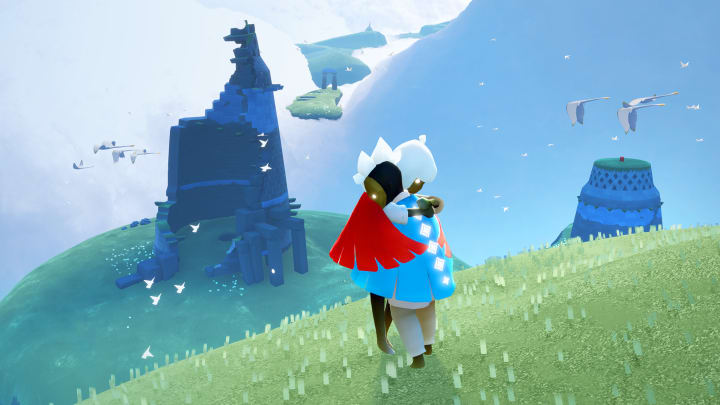How thatgamecompany helped forge the cozy game genre

If you’ve been on the internet for any amount of time, you’ve probably seen the great difficulty debate unfold before. It happens whenever a game that’s deemed too easy or too difficult is released — Dark Souls is too hard, and Kirby is too easy, and both either should or should not have a difficulty setting in the opposite direction. It’s an argument that’s been debated for almost as long as video games have been around, and it seems like just about every game is subjected to it now.
In recent years, some games and companies have managed to escape the difficulty debate, and after talking to thatgamecompany CEO Jenova Chen at SkyFest 2024, I now think I have a better understanding of why. And it all has to do with cozy games.
Thatgamecompany has been producing relaxing, meaningful, and some would even say cozy games for almost 20 years now under the leadership of Jenova Chen. TGC had moderate success with its PlayStation-exclusive games Flow and Flower, but it was Journey that really had the world taking notice. Journey was a solemn, simple game that had players walking through a desolate wasteland and relying on other random players for help. It was a game about trust and cooperation, even if you couldn’t communicate with your partner.
It was followed up with free-to-play MMO Sky: Children of the Light, which just celebrated its fifth year with a huge celebration in-game and in-person in Japan called SkyFest. The event saw millions of people log in to the game and hundreds of thousands of people attending in person — it’s a popular game, and part of that popularity comes down to how approachable it is.
Sky, like Journey, is quite an easy game in terms of actual mechanical challenge, but if you scour the internet, you’ll struggle to find anyone complaining about that. However, as easy as games like Journey and Sky are, some players, including Chen’s family, still struggle with them.
“I can’t tell you how many times I’m just cursing in the backroom where I see a grandma playing our games,” Chen says. “She can use a controller, she can move, she can look around, she can jump, but she cannot jump and move forward at the same time, she cannot jump and aim and move forward to the next platform, she couldn’t beat the rising platform level of Journey.
“Certainly, if you see my wife playing, it’s excruciating pain. Not to mention my mom, my own mom still cannot finish Journey. And I thought ‘There’s only one button or two, how could you mess this up?’”
TGC has experimented with different control schemes over the years to create games that are accessible and approachable to a lot more people. Flow, for example, requires no button inputs to play, just tilting the controller. Flower focuses on tilting the controller, too, but also adds a single button input. That’s about as far as you can get before Chen’s mom taps out, but as games become more complex, so do the controls, so keeping the mechanical challenge of the game design simple becomes a necessity. According to Chen, TGC’s games aren’t about overcoming challenge – though he admits he liked Dark Souls for that approach – but instead about eliciting emotion.
“The goal here isn’t about making people get the quality of entertainment from overcoming a challenge,” Chen explains, “With our games, the focus is that we want to change their emotions, so stopping them at a certain challenge isn’t really necessary. We were just trying to make the interaction an instrument to elicit emotion, not a mastery for our player.”
That’s an interesting way of looking at things, and it certainly matches up with what TGC’s been doing for years. When people talk about Journey, they talk about the experiences they shared with others. When I spoke to fans about Sky: Children of the Light at SkyFest, not a single person mentioned controls or difficulty or challenge — every single one spoke about the friends they’d made, the people they helped along the way, and the funny moments that were spawned by running through a world together with little communication. In TGC’s games, whatever mechanical complexity exists, it gets pushed backstage, so emotion and social experience can take the spotlight.
It’s also an approach we’ve seen a lot in recent years, with the rise of “cozy” games that are more about the good vibes than they are about challenge or difficult gameplay. Many of these games focus on menial, methodical tasks like farming, fishing, and exploring, and most don’t feature any combat or major mechanical challenges. They are, in some small way, built on top of the work TGC has been doing since 2006.
Take Thunder Lotus Games’ Spiritfarer, for example. It’s a gorgeous game that is focused primarily on slowing down, taking time, and, more importantly, feeling something. As you ferry souls to the afterlife, you become attached, you get to know them and love them, and then just like that, they’re gone. There’s platforming, but no platforming challenges to speak of. There’s a time management mechanic, and a farming mechanic, and a town management mechanic, but none of these are difficult or even strictly necessary — failing to farm the right kind of wheat won’t result in a game over. As Chen said, the interaction is an instrument to elicit emotion in Spiritfarer, just as it is with Journey, and just as it is with Sky: Children of the Light.
Many credit Stardew Valley with the rise of the cozy game, but more credit needs to be given to Chen and the team at thatgamecompany for their work in not only creating works that fit perfectly into the genre, but also helping it become mainstream. TGC paved the way for a whole community of games that aren’t defined by their mechanical complexity, but for the emotions they elicit — games that are immune from the great difficulty debate. Chen, modest as he is, certainly seems to think he deserves a bit of credit for it, too.
“We’ve been in this space since we started,” Chen says before joking, “If anything, I was like, ‘Didn’t you know we were here the whole time for 18 years?’”
Thatgamecompany’s next game is in development, Chen confirmed, but he’s remaining tight-lipped on what it is and what it’ll look like. Whatever the game ends up being, though, it will still be the cozy, comfy, meaningful kind of game you’ve come to know and love from the studio.
“What we want is a game that is like a Pixar movie, where everybody can enjoy it together. And what we do best in our games is connect people together, and we want to connect family, we want to connect men and women, we want to connect parents and children. So that’s where we’re staying.”
